BeoVox Penta Center Channel Concept
- This topic has 53 replies, 8 voices, and was last updated 11 months, 3 weeks ago by
Evan.
- AuthorPosts
- August 7, 2023 at 7:59 pm #22828
If you use Penta for Left&Right channel and a TV for the Center, then this setup was pretty good with a MX8000 and the DolbyDigital5.1 System.
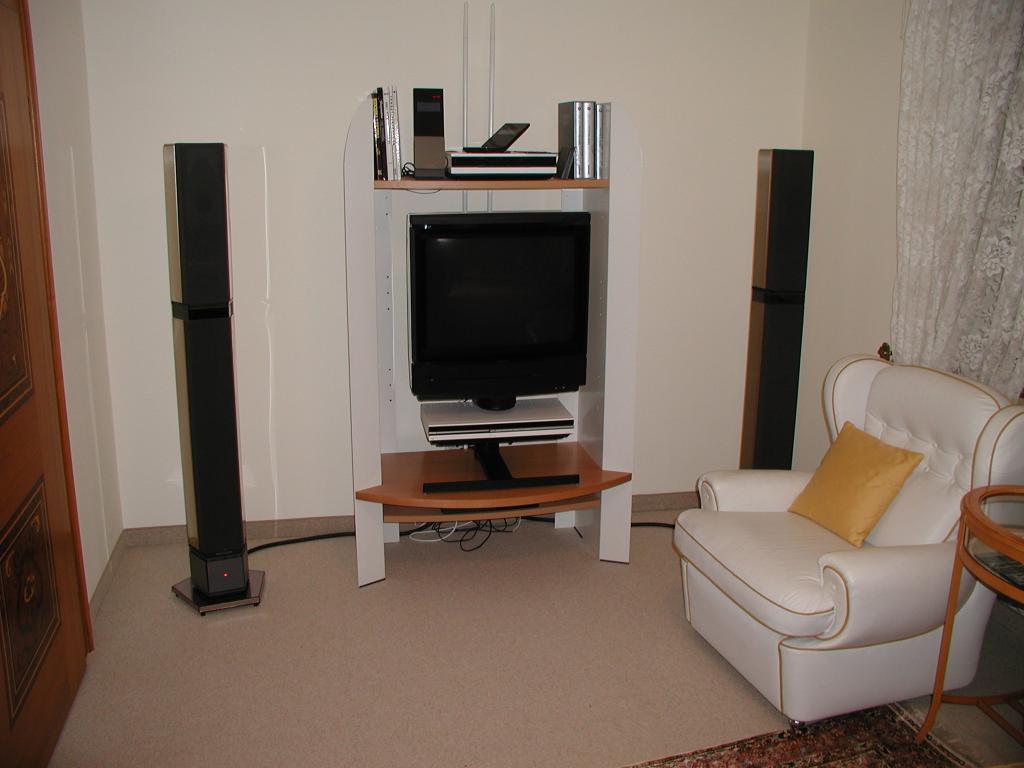 In the background are 2 BL8000… The Pentas are listed in the MX8000 system software, also the BL8000 and the distance to the listener. There is also an option for a subwoofer. The Center speaker of the MX8000 (2x 2way system) is good enough for small/middle size rooms. Surprisingly the option “subwoofer” is not a good selection, it is way to much. Just the opposite is the better solution: switch subwoofer to on, but dont use the subwoofer. The sound is better. The same will happen if you use the Penta as a center. Way to big. Or do we talk about a room with 120qm oder bigger? Have you already tried a Penta in real life as a center?
In the background are 2 BL8000… The Pentas are listed in the MX8000 system software, also the BL8000 and the distance to the listener. There is also an option for a subwoofer. The Center speaker of the MX8000 (2x 2way system) is good enough for small/middle size rooms. Surprisingly the option “subwoofer” is not a good selection, it is way to much. Just the opposite is the better solution: switch subwoofer to on, but dont use the subwoofer. The sound is better. The same will happen if you use the Penta as a center. Way to big. Or do we talk about a room with 120qm oder bigger? Have you already tried a Penta in real life as a center?I’ll admit I get carried away sometimes but this project is more about matching the tonal characteristics between L, C and R (read: “timbre”) and less about overall SPL. The question [here] isn’t “will it center channel?” but more trying to remove the compromises that seem to affect center channel loudspeakers in general.
The idea isn’t far off from what most mastering studios implement. Three large full-range loudspeakers that are all identical.
I suppose it affects music listening more than movie/tv but I’m sure there will be an improvement across all use cases.
Consider it a thought experiment for now as the time when I actually start to make dust is far in the future!
March 24, 2024 at 2:01 am #31557Hey everyone – excited to share some recent thoughts on the center channel idea. I think its time this concept finally turn into a project.
Recently my partner and I moved to a new house and our new AV room could really use a nice center channel. I have a few extra Pentas kicking around so I think its time to start building one of these.
I plan on designing this to fit a pair of cells(?) in the Ikea Kallax shelf (4×2 unit). This spot used to be occupied by the AVP and BL4K that I previously used as a center channel. I don’t think its going to take up the entire 690*335mm opening (although it could!) but it will probably take up most of it.
Before I start modeling the 3D on this, I wanted to open it up for a discussion. I want to design something to share, hopefully something that could be replicated by others interested in this project (first as CAD and then likely a 2D drawing pack).
In my mind there are two ways this could go:
- Traditional wooden box architecture, cloth fret.
- A more penta-like solution. Something 3D printed (sturdily) that has the spirit of the Penta cabinet geometry baked into its industrial design.
Both of these ideas have there advantages and disadvantages but I wanted to open it up here for a discussion as I want this to benefit as many people as possible. I think many B&O fans would enjoy having such a speaker in their system. Maybe two variants get designed after all? My dream is that it is eventually driven by a remote BL Penta (150/200 style) amp that sits in one of the other shelf cells.
I was brainstorming all of this and doodled this in my sketchbook today. I hope it inspires you to share some of your thoughts.
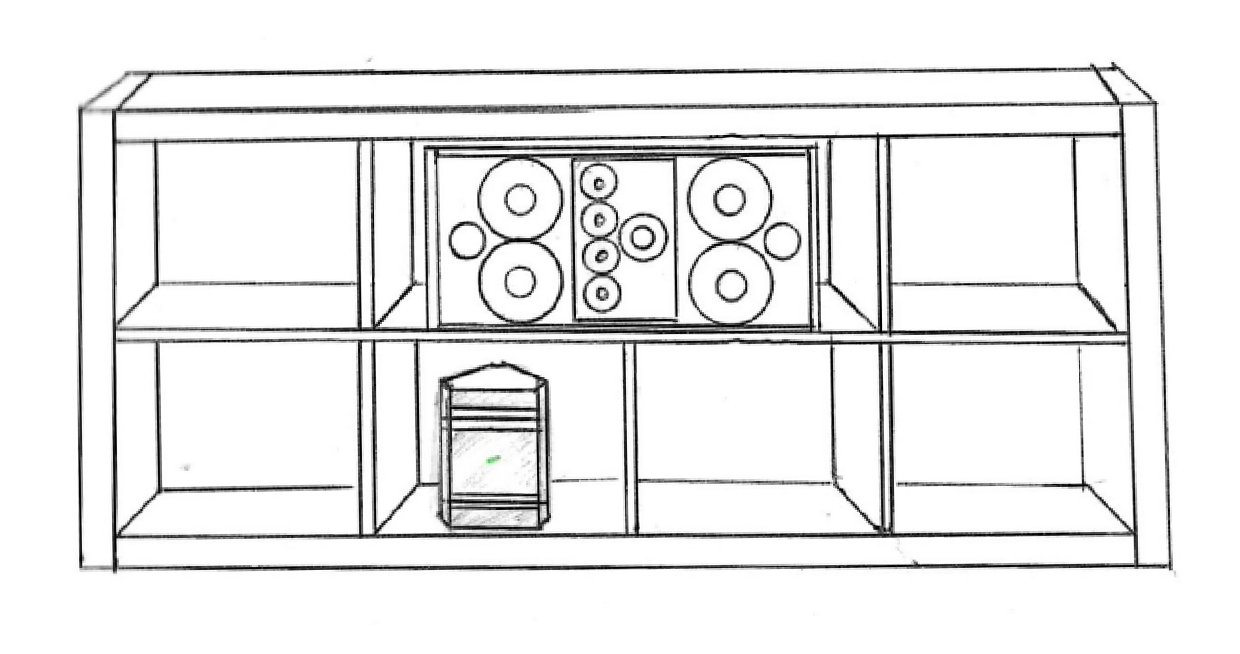
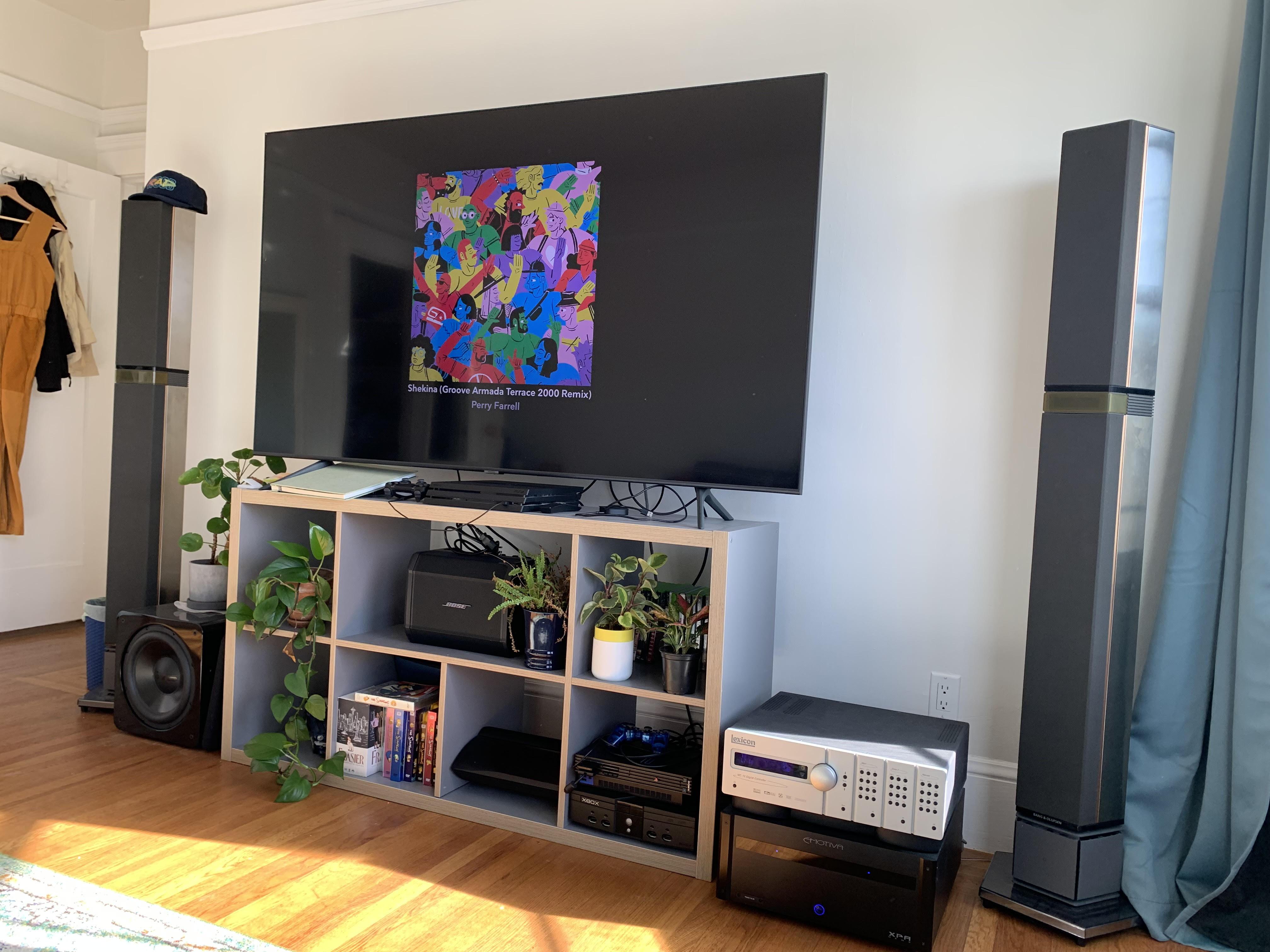
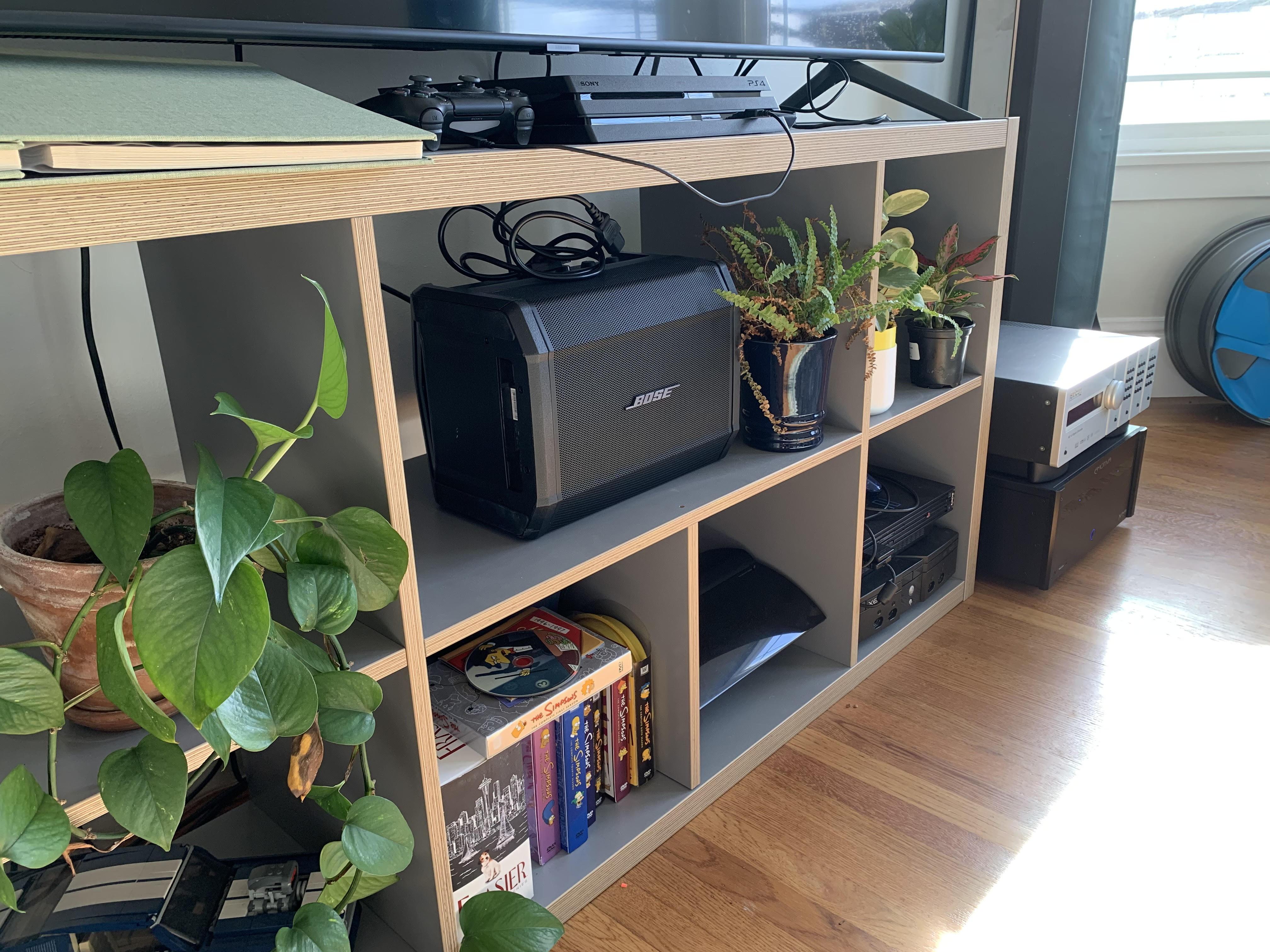 March 24, 2024 at 1:45 pm #31574This is what I’ve done with a 7.2. Works a treat. Need to source 5v USB to trigger the 7.x on from either AV amp or TV if not using powerlink.
March 24, 2024 at 1:45 pm #31574This is what I’ve done with a 7.2. Works a treat. Need to source 5v USB to trigger the 7.x on from either AV amp or TV if not using powerlink.I got a BeoLab 7.1 (wired using both left and right channel as center channel). It is at great center speaker with lot of power and clarity. If you go for at home-brew solution with a passive speaker I would build something around a non-B&O center speaker … A good second hand B&W or whatever you prefer. I believe that will give you a way better acoustic result. You can still modify the speaker cabinet to match the Pentas in some way.
March 24, 2024 at 1:50 pm #31577That already looks great!Hey everyone – excited to share some recent thoughts on the center channel idea. I think its time this concept finally turn into a project. Recently my partner and I moved to a new house and our new AV room could really use a nice center channel. I have a few extra Pentas kicking around so I think its time to start building one of these. I plan on designing this to fit a pair of cells(?) in the Ikea Kallax shelf. This spot used to be occupied by the AVP and BLK that I previously used as a center channel. I don’t think its going to take up the entire 690*335mm opening (although it could!) but it will probably take up most of it. Before I start modeling the 3D on this, I wanted to open it up for a discussion. I want to design something to share, hopefully something that could be replicated by others interested in this project (first as CAD and then likely a 2D drawing pack). In my mind there are two ways this could go:
- Traditional wooden box architecture, cloth fret.
- A more penta-like solution. Something 3D printed (sturdily) that has the spirit of the Penta cabinet geometry baked into its industrial design.
Both of these ideas have there advantages and disadvantages but I wanted to open it up here for a discussion as I want this to benefit as many people as possible. I think many B&O fans would enjoy having such a speaker in their system. Maybe two variants get designed after all? My dream is that it is eventually driven by a remote BL Penta (150/200 style) amp that sits in one of the other shelf cells. I was brainstorming all of this and doodled this in my sketchbook today. I hope it inspires you to share some of your thoughts.


 March 24, 2024 at 7:44 pm #31612That already looks great!
March 24, 2024 at 7:44 pm #31612That already looks great!Thanks! Ok that’s one vote in for the wooden box route.
March 24, 2024 at 8:43 pm #31618Ok I guess the first step (in the modeling domain) is to get the Kallax into Solidworks. I’ll build the Penta-C(?) / Center Penta(?) What should we name this thing?? …into the Kallax for reference along the way.
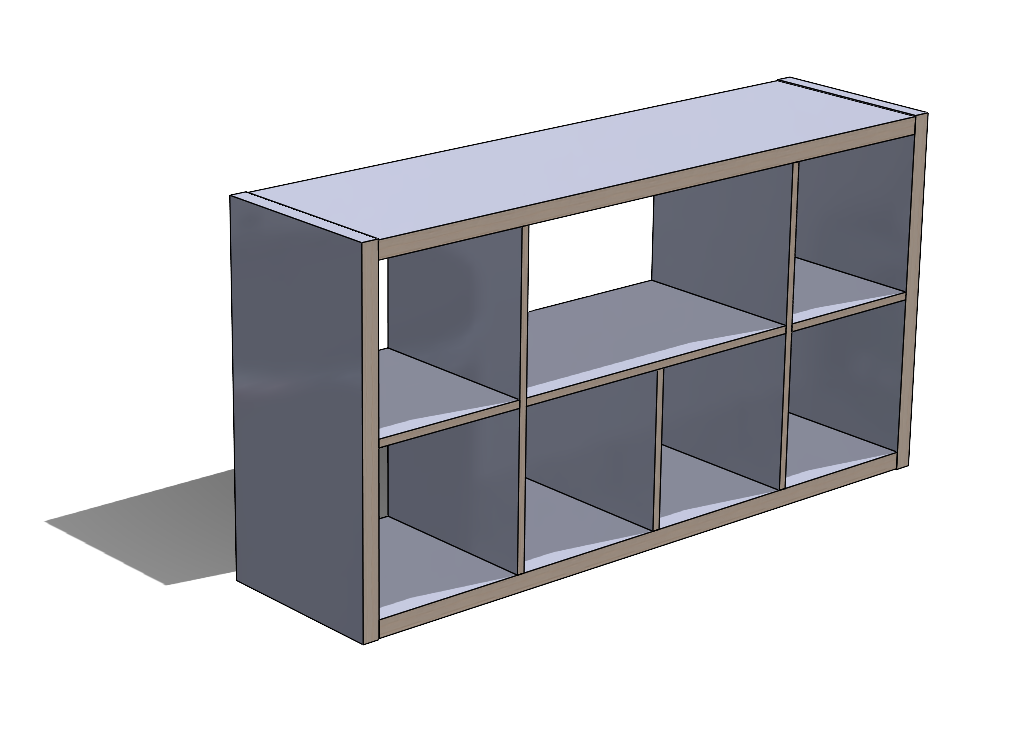 March 24, 2024 at 9:15 pm #31622March 25, 2024 at 12:48 am #31630Centa Penta, surely!Hahaha genius! Centa Penta it is!March 25, 2024 at 12:57 am #31631
March 24, 2024 at 9:15 pm #31622March 25, 2024 at 12:48 am #31630Centa Penta, surely!Hahaha genius! Centa Penta it is!March 25, 2024 at 12:57 am #31631Managed to get another chunk of progress out of the way for this project: I just scored some donor BeoVox Pentas locally off CL. These things have been through some traumatic previous ownership at some point but should be able to give me what I need to build at least one good Centa. Going to have to get parts ordered for it so I can get it up to snuff for a few specific measurements I need to make.
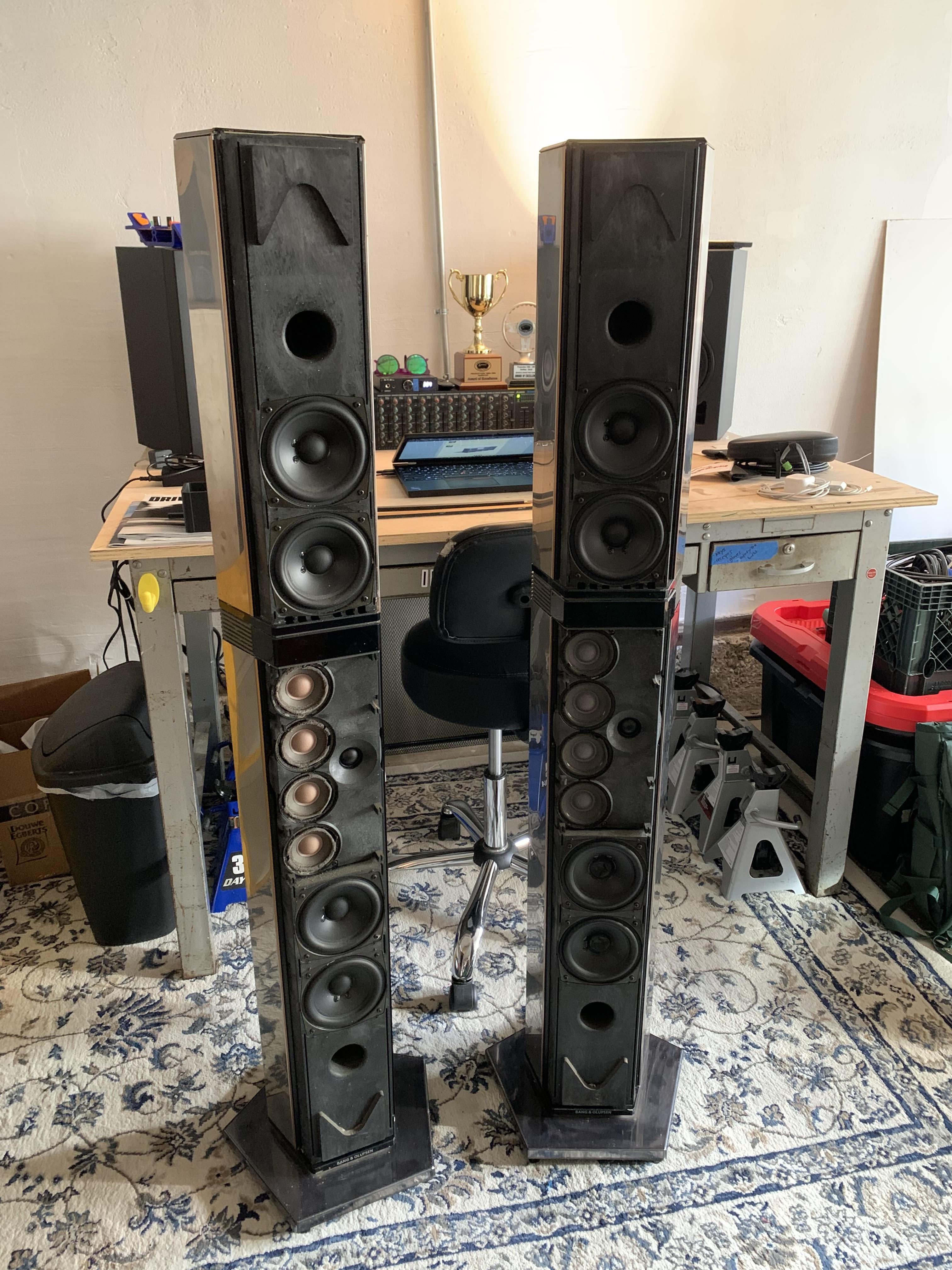
They are perfect for this project honestly, I should be able to use these for reverse engineering for most of the journey and can reference the other Pentas in my collection if necessary.
What a difference the amp makes by the way. So much shorter and lighter!
March 25, 2024 at 1:53 am #31633Some interesting notes from the donor pair:
Type 6611 / serials 06574475 & 06574459
The midrange transducers had no gaskets to the baffle whatsoever and many screw heads already loose. Maybe someone was already in these speakers before?
Most interestingly, these seem to have been originally sold in China as there is some sort of import sticker underneath. One was scribbled out but the other was intact enough to run through google translate:
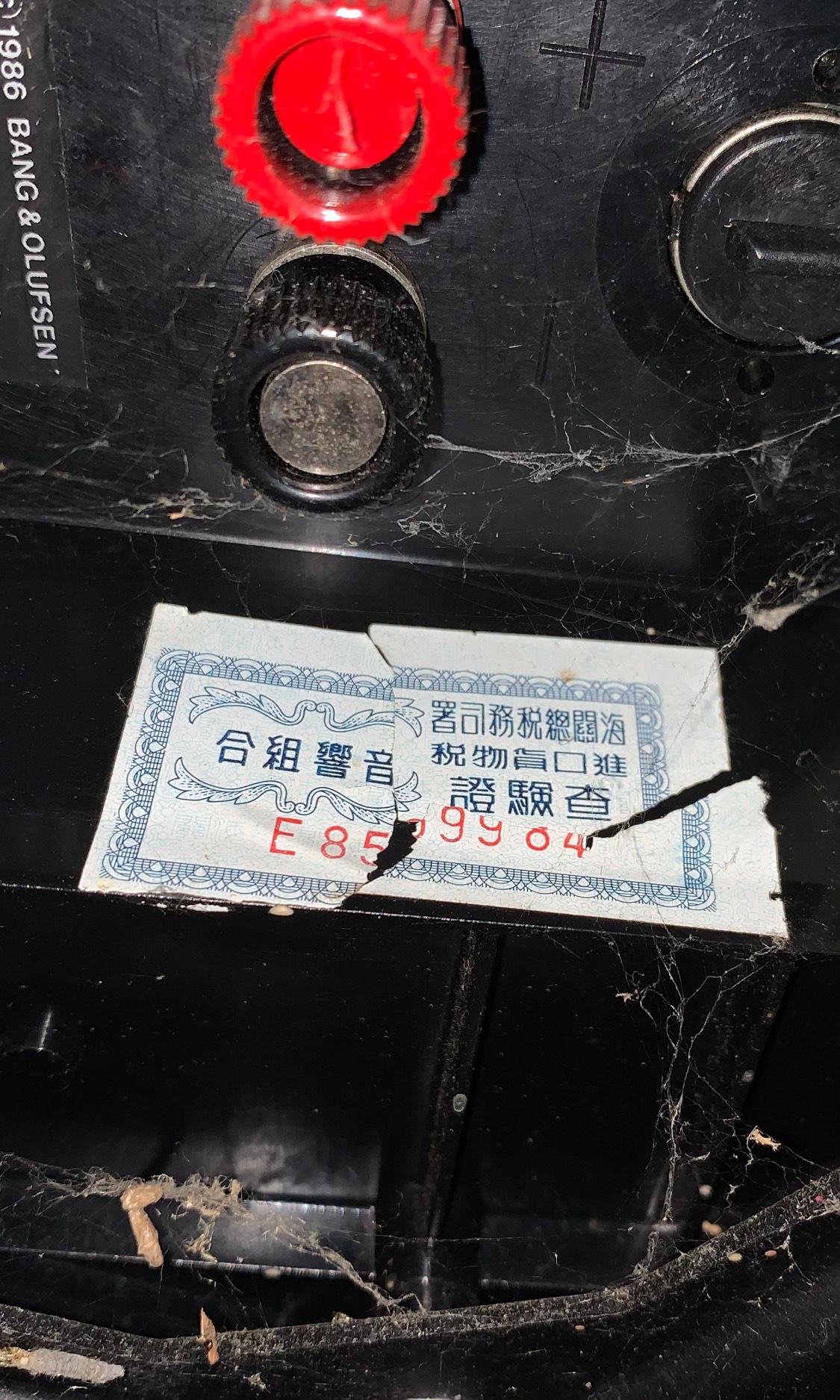
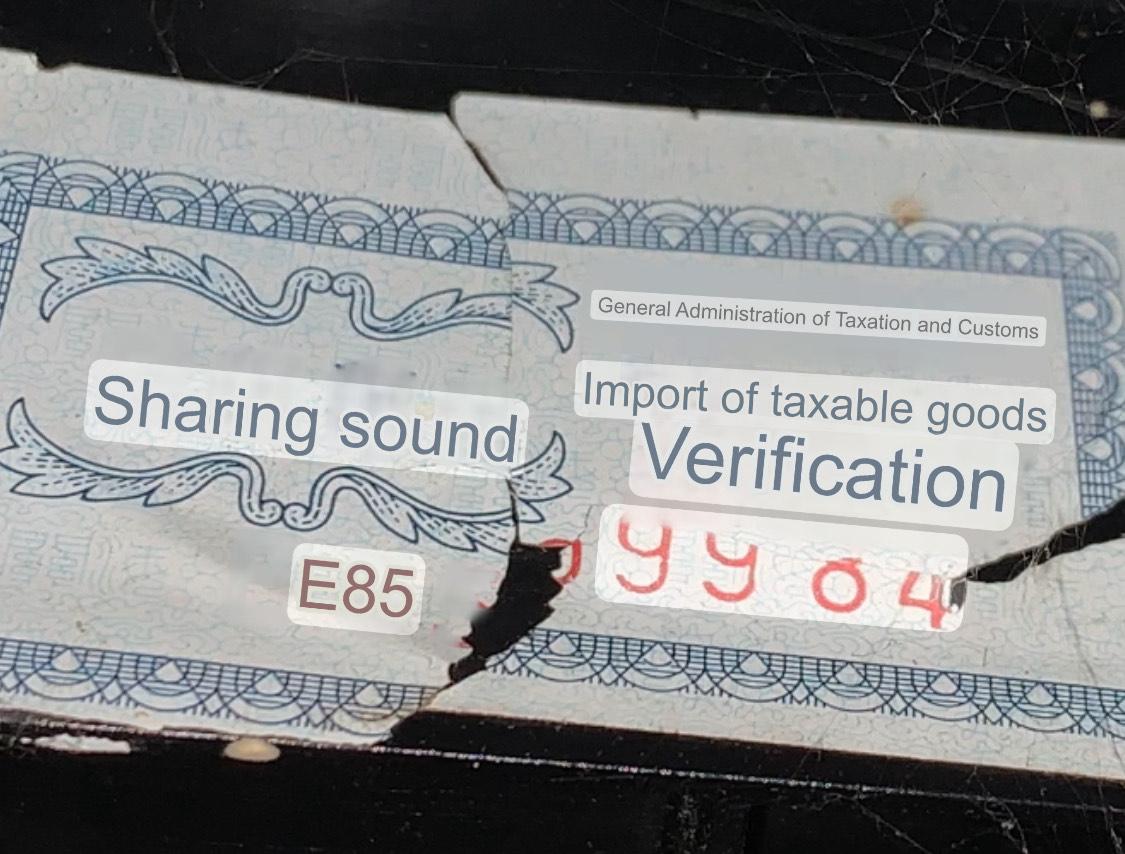
Fascinating that these speakers built in Denmark made their way to China and then to California. Explains their condition for sure!
March 25, 2024 at 3:56 pm #31660Anyone happen to know the manufacturer of the Penta woofer? It’s marked J82TNI and B&O part number 8480197. Very few hits from a quick google search.
Interesting to note – the basket is not vented below the spider. Bit of a odd feature for a home / hi-fi speaker.
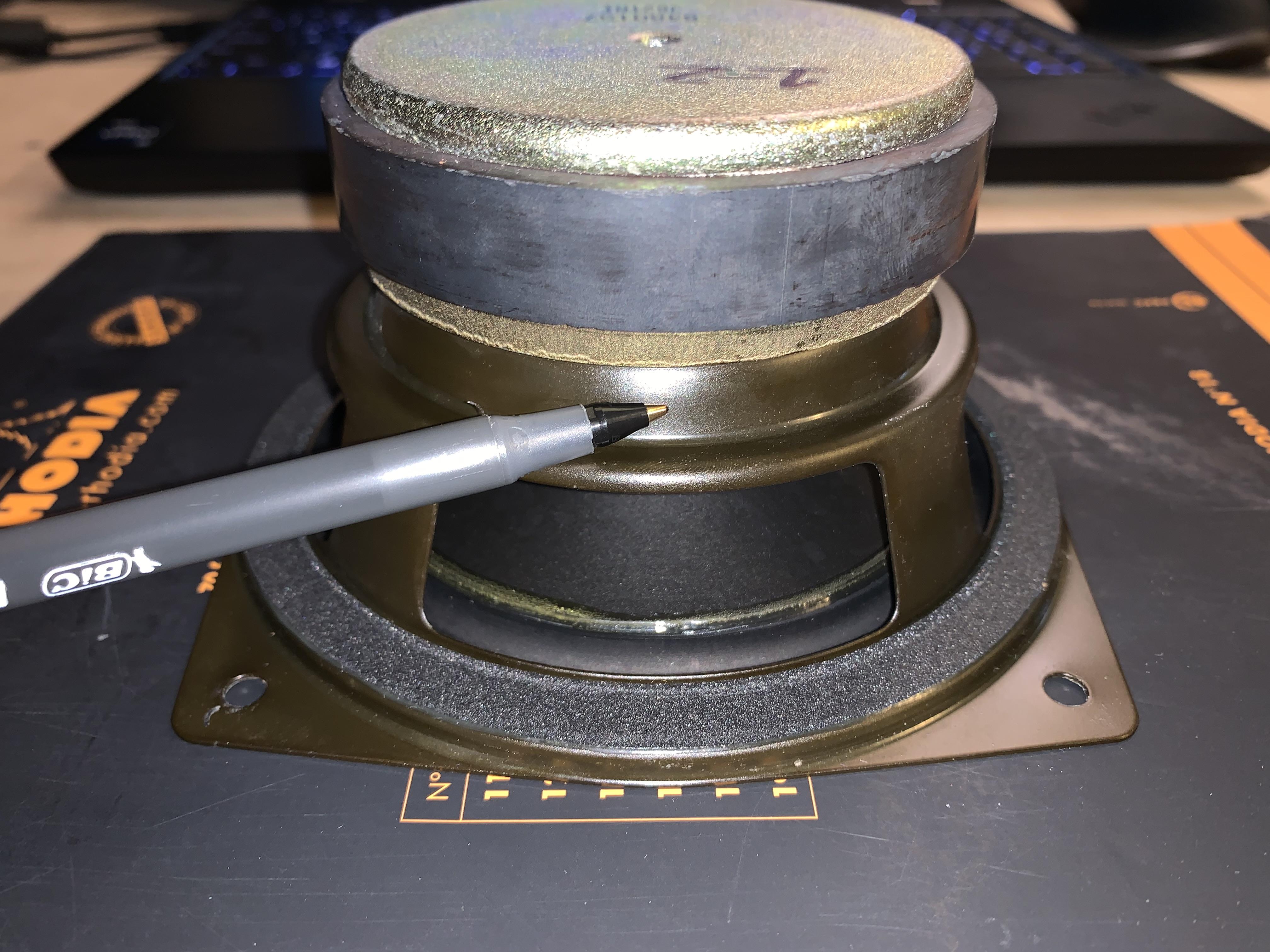
I really hope you guys like engineering details. I’m going to put one of the woofers and one of the mids (once refoamed) through the Klippel measurement at work and report back. It will be interesting to see how these drivers measure and how they compare to modern transducers.
March 26, 2024 at 12:56 pm #31688I think B&O used speakers that were designed for the use of being a car hifi speaker.
The idea is simple, if we do have a speaker with a limited space, an ordinary speaker wouldn’t perform in an apropiate way. That’s why they used speakers, that were intended as car speakers. Haas was the manufacture of these speakers and they were known for car Hifi systems. Later Haas was a part of IT&T. IT&T was bought by Nokia in the late ninetees.
March 27, 2024 at 2:50 am #31732Klippel on the woofer now finished and the results are in!
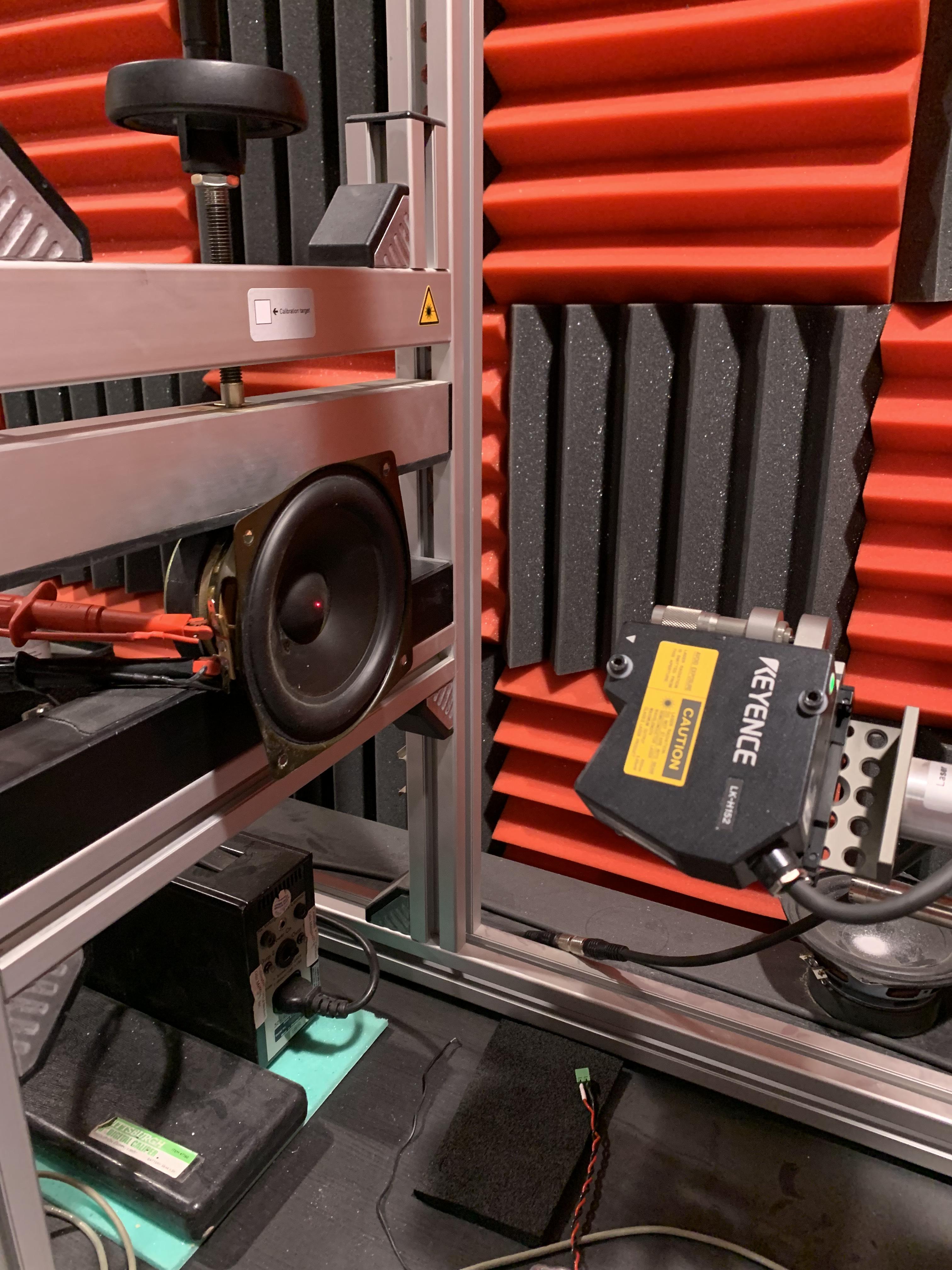
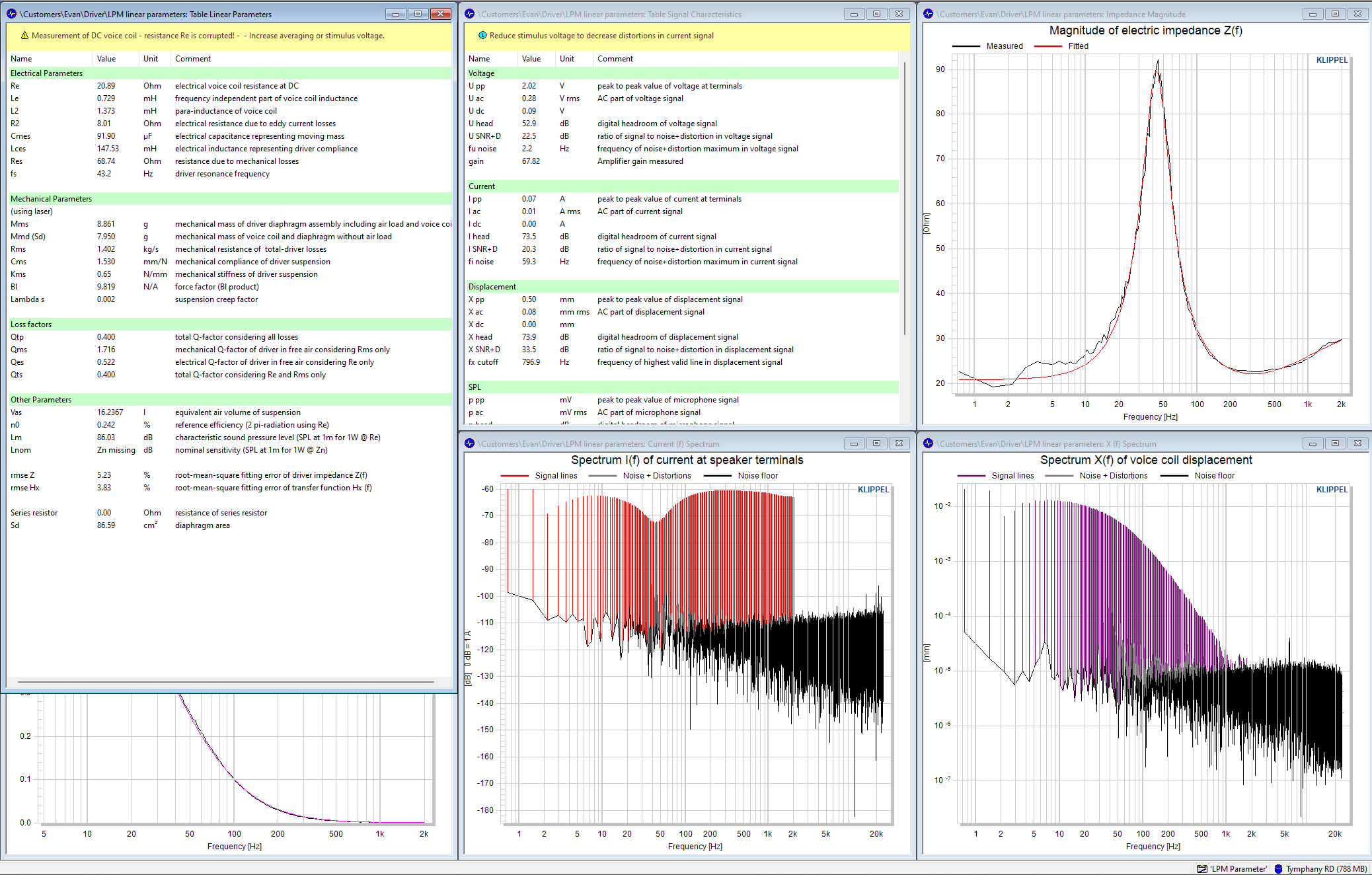
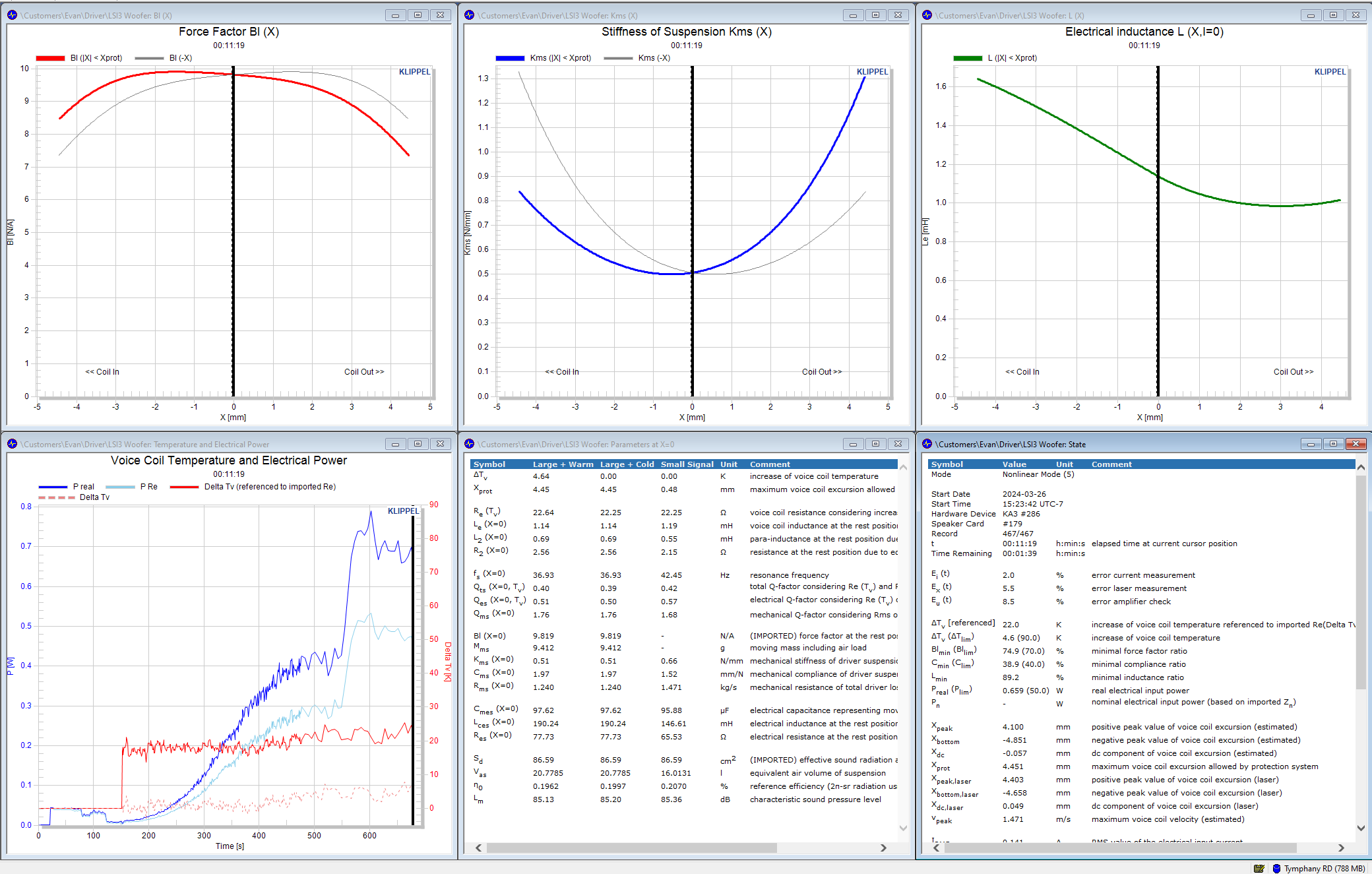
Not bad 38(?) years on. xMax of roughly 4.5 mm and a very versatile Qts (0.4). Also very compliant. Some interesting conversations were sparked in the office as a result and I’m considering some small deviations from the original Penta design in order to slightly better position the Centa Penta for its new role in center channel work.
March 27, 2024 at 3:03 am #31733I think B&O used speakers that were designed for the use of being a car hifi speaker. The idea is simple, if we do have a speaker with a limited space, an ordinary speaker wouldn’t perform in an apropiate way. That’s why they used speakers, that were intended as car speakers. Haas was the manufacture of these speakers and they were known for car Hifi systems. Later Haas was a part of IT&T. IT&T was bought by Nokia in the late ninetees.
Well I did do some googling on Haes (the midranges from this pair of Pentas are from Haes) which was definitely serving the German car industry for some time.
I have never heard of Haes until now. It’s interesting how transducer companies have consolidated or otherwise changed over the years.
I work in automotive audio (at a large loudspeaker and electronics tier-1/ODM/JDM) myself and we borrow inspiration from Pro + Consumer transducer technology because they offer compelling form factors. Hard to imagine it was the other way around at one point!
March 27, 2024 at 12:20 pm #31746Cool. I appreciate seeing data even if I don’t understand exactly what it is saying. 😉
Is the testing a driver easy enough where it is possible to test multiple drivers?
I’d be curious about the driver uniformity, especially the refoamed mid-ranges. With some measure of “sameness” you could either pick the best of the batch for your project or sort for best matched pairs.
Glitch
March 27, 2024 at 1:10 pm #31748Thank you very much for the data. This is fantastic.!!
Next step, can you do a comparison of the mids with foam and rubber surrounds?
And can you meassure the whole speaker? There is a lot of talk in the german section about that the penta can’t do deep bass and they used the trick to overaccentuate some frequency?
But is this true?
March 27, 2024 at 3:16 pm #31754Cool. I appreciate seeing data even if I don’t understand exactly what it is saying. ? Is the testing a driver easy enough where it is possible to test multiple drivers? I’d be curious about the driver uniformity, especially the refoamed mid-ranges. With some measure of “sameness” you could either pick the best of the batch for your project or sort for best matched pairs. Glitch
I’m still learning my way around the hardcore transducer science myself, honestly. Important things here though are things like suspension and BL symmetry. It is not uncommon to see asymmetries like this driver, it is pretty normal. Indeed, we could test a few more to see if the asymmetry was intentional or not.
What these tests do not offer are acoustic responses. To test the spectral capability we would need to measure on a baffle with microphones etc. To really understand uniformity, we would need to both Klippel and mic several samples to understand the consistency.
Yeah, the Klippel LSI & LPM tests only take about 15 min to run. Easy to put a few speakers through.
I definitely plan on putting at least one of my re-foamed midranges through the Klippel test to see what the parameters are like. If I get the opportunity to test the acoustic response I will do so. If someone wants to lend me a mid with a rubber surround for testing, I will make it happen.
March 27, 2024 at 3:22 pm #31755Thank you very much for the data. This is fantastic.!! Next step, can you do a comparison of the mids with foam and rubber surrounds? And can you meassure the whole speaker? There is a lot of talk in the german section about that the penta can’t do deep bass and they used the trick to overaccentuate some frequency? But is this true?
Of course! Glad to be able to put some useful data out there for BeoWorld.
Yes of course, I can definitely compare a foam and rubber surround midrange. I don’t have a midrange unit with a rubber surround so I will need someone to supply it.
I don’t have an anechoic chamber here but we can try to get some full system acoustic responses at the end of the project. This will be important to compare the Centa Penta to the original, though, so I will do my best.
Regarding deep bass (20Hz – 40Hz) I think this is simply a matter surrounding the bass reflex port tuning/physics. A ported (or speaker with passive radiators) is very limiting below the tuning frequency. The f3 / LF roll-off is usually much flatter and more natural with a sealed enclosure. Perhaps the guys in the German forum should plug the ports and try adding some boost with a DSP. This woofer should work nearly as well in a sealed box. I am not sure what the system tuning is on the Penta exactly but the spec sheet here on Beoworld says 40Hz which is pretty normal for a speaker this size. I’ll have a more precise answer for you in a few days.
March 27, 2024 at 9:59 pm #31789What these tests do not offer are acoustic responses. To test the spectral capability we would need to measure on a baffle with microphones etc. To really understand uniformity, we would need to both Klippel and mic several samples to understand the consistency.
My (possibly bad) assumption is that if two drivers are similar mechanically (displacement response, driver shape, etc.) and electrically (impedance vs frequency, etc.) that they will be similar acoustically.
I think that many people underestimate how easy it is to do a “suboptimal” surround replacement. I’ve found some drivers, especially ones with tight tolerances, can be very finicky to get right. I’ve been able to pick up differences in alignment techniques (centering, foam tension, etc.) with the relatively crude measuring equipment that I have.
Some people make it seem like refoaming is always trivial. Maybe they are right (and I am just not very good at it), but I think it is more likely that they aren’t testing their work. It reminds me of something that happened at work. We had a group of developers that kept reporting that they “hadn’t found any bugs in their software”. I eventually figured out that statement was their way of saying that “they never tried testing their software”. 😉
I’m looking forward to seeing any test results that you are willing to share…
Glitch
March 29, 2024 at 6:05 pm #31896I’ve learned that transducers are inherently very hard to manage (even inside the same batch) consistency-wise in production. There are a lot of discussions about moving away from paper (among many other reasons) for cone materials due to the difficulties of managing consistency – even in the same batch. Transducers are basically still completely hand-made save for the hard parts in the motor+basket. They may be made on an assembly line, but very few lines are automated, even in 2024. Glue dispense is important as it has a major impact on mms of the driver but there still many instances where this is set by the operator on the line. Many of the soft parts and even the voice coil subassembly are hand-picked and assembled. It really takes a lot of skill to build up the skill and then maintain good consistency.
Indeed, refoaming the drivers is not as trivial as some make it seem. At the end of the day the former alignment is controlled by both suspensions and the surround is one of those. The drivers are shimmed with a gap gauge and coil position in the gap.
- AuthorPosts
- You must be logged in to reply to this topic.
